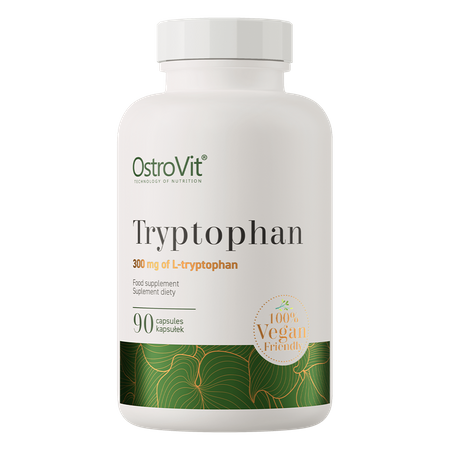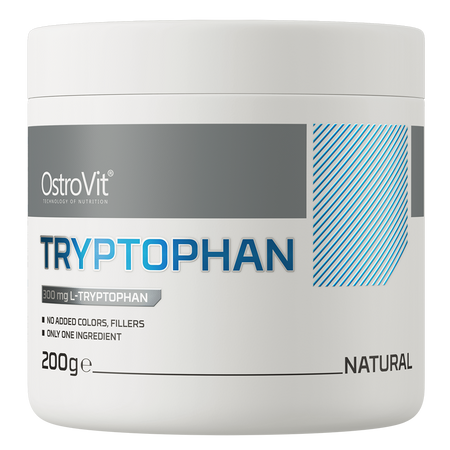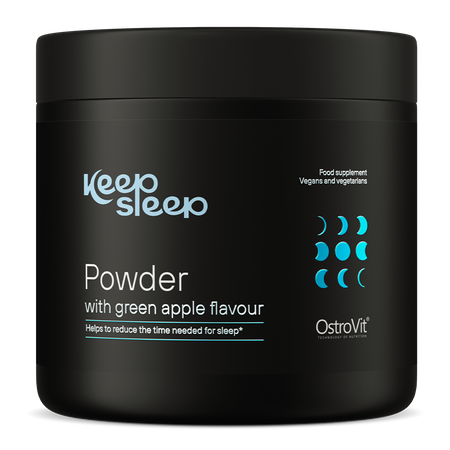Tryptophan
Tryptophan is one of the eight essential protein amino acids necessary for the proper functioning of the human body.
It can participate in the synthesis of melatonin, as well as serotonin or rhodopsin. It can also be a precursor of niacin and pyridoxine and participate in the regulation of neurotransmitter levels. It is an amino acid that is also eagerly used by athletes and people who care about their figure.
Tryptophan - what is it?
Tryptophan is an exogenous amino acid that the human body cannot synthesize on its own, which is why it must be supplied to the body along with the daily diet.
Its biologically active form is a molecule with an "L" configuration, i.e. L-tryptophan.
Amino acid is well absorbed from food and is absorbed from the gastrointestinal tract.
Sources of tryptophan in food
Human body is not able to produce tryptophan on its own, which is why an adequate supply of amino acids with food is so important.
Good sources of tryptophan can be food such as:
- spirulina,
- soybeans and flax seeds,
- pumpkin seeds,
- sunflower seeds,
- chicken breast meat,
- almonds,
- pork loin,
- salmon,
- tuna,
- egg yolk,
- walnuts.
In case of insufficient supply of tryptophan along with the daily diet, it is worth considering taking dietary supplements rich in this valuable amino acid to ensure the proper functioning of the body and well-being.
Tryptophan - action
Tryptophan is an amino acid necessary for the proper functioning of the body. It can support the proper functioning of the nervous system, as well as maintain intestinal homeostasis and strengthen immunity.
Tryptophan may also participate in the synthesis of melatonin, the sleep hormone. Melatonin is produced by the pineal gland and is responsible for the circadian rhythm and regulation of the sleep cycle. Adequate supply of tryptophan can improve the quality of sleep and facilitate falling asleep and help fight insomnia.
Tryptophan may also be a precursor of serotonin, called the hormone of happiness, which is a very important neurotransmitter in the body. Serotonin can improve mood and well-being, but the scope of its action is much wider. The hormone can mediate the transport of signals between nerve cells and what's more, it can affect platelet aggregation. In addition, serotonin can support the proper functioning of the digestive system, support metabolism and regulate appetite. Tryptophan deficiency may therefore result in serotonin deficiency and thus may increase the risk of mood deterioration and depression.
Tryptophan can also support the work of eyes and protect them from the harmful effects of UV radiation. The compound can also participate in the synthesis of rhodopsin, a dye that contributes to the stimulation of photoreceptors and obtaining an image.
Amino acid is also appreciated by athletes, because together with L-arginine it can participate in the production of growth hormone, which can directly contribute to the increase in muscle mass.
Indirectly, tryptophan can also affect the process of glycogenolysis and lipolysis, and thus contribute to the reduction of body fat. When we add to this the possible ability to suppress appetite, tryptophan gains in the eyes of people who care about their figure and use reduction diets.
Tryptophan can also support lactation and strengthen the immune system.
Tryptophan deficiency in the body
Tryptophan deficiency in the body is most often caused by poor diet and repetitive nutritional errors. It can also occur during diseases with malabsorption from the gastrointestinal tract. It is estimated that a significant part of the population may not provide the necessary amounts of tryptophan to the body.
The most common symptoms of tryptophan deficiency include:
- mood drops,
- sleep disorders and even insomnia,
- anxiety,
- deterioration of concentration and memory processes,
- apathy.
A decrease in tryptophan levels can be observed among people suffering from many neurological and psychiatric diseases.
Excess tryptophan in the body
Excessive supply of tryptophan is observed extremely rarely. Excess amino acid in the body may occur as a result of incorrect use of dietary supplements rich in this compound.
Symptoms of excess tryptophan in the body may be:
- headaches,
- nausea,
- vomiting,
- drowsiness.
In extreme cases, visual disturbances and fatty liver may occur.
Tryptophan supplementation – is it worth it?
Taking dietary supplements rich in tryptophan should be considered during the occurrence of mood disorders, nervous system, as well as during sleep problems. The amino acid can also be a good support among people who lead a stressful lifestyle and among athletes.
Tryptophan can be taken alone or in multicomponent preparations. The amino acid is often accompanied by melatonin and vitamin B6.
A good solution is to take tryptophan in the evening before bedtime.
Contraindications and possible side effects of tryptophan
Taking dietary supplements rich in tryptophan in accordance with the manufacturer's recommendation should not contribute to the occurrence of side effects.
If the recommended portions of the product are exceeded, symptoms such as nausea, vomiting, headaches or diarrhea may occur.
Dietary supplements with tryptophan should not be used by people with cirrhosis of the liver and hypersensitivity to any of the components of the preparation.
In addition, tryptophan can not be combined with drugs from the group of monoamine oxygenase inhibitors, i.e. preparations used to treat depression. Simultaneous intake of tryptophan and MAO inhibitors may contribute to the occurrence of serotonin syndrome, which is manifested by hallucinations, overheating of the body, increased sweating and increased blood pressure. Serotonin syndrome can be dangerous to human health and life.



